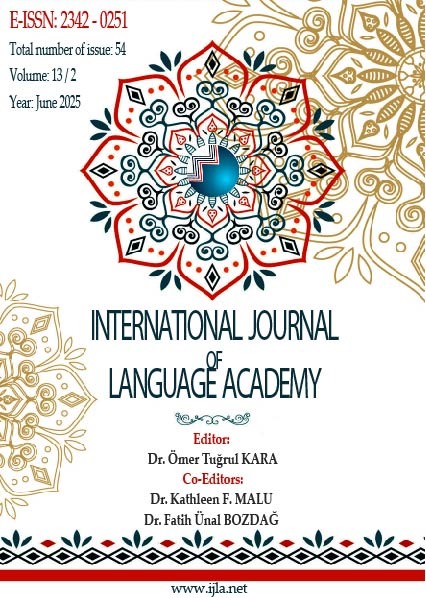Author :
Abstract
Bu çalışma, ortaokul öğrencilerinin konuşma becerisine yaratıcı okuma etkinliklerinin etkisini belirlemek amacıyla yürütülmüştür. Araştırma, Türkçe eğitiminde dört temel beceriden biri olan konuşma ve okumanın birbirine olan etkisini göstermesi bakımından önemlidir. Araştırmada nicel araştırma yöntemlerinden deney ve kontrol gruplu “deneysel desen” kullanılmıştır. Araştırmanın örneklemini Kırşehir ilinin Akpınar ilçesine bağlı bir ortaokulda öğrenim gören beşinci sınıf öğrencileri oluşturmuştur. Araştırmanın katılımcıları, olasılık dışı örnekleme yöntemlerinden “kolaylı örnekleme” ile seçilmiştir. Çalışmanın amacı doğrultusunda uygulanacak yaratıcı okuma etkinlikleri belirlenmiş ve MEB müfredatı ile uyumlu bir şekilde haftalık ders planları hazırlanmıştır. Yapılacak etkinlikler deney grubu öğrencilerine 10 hafta uygulanırken kontrol grubunda MEB müfredatı ile dersler işlenmiştir. Katılımcılara sürecin başında ve sonunda; Kişisel Bilgi Formu, Konuşma Kaygısı Ölçeği, Konuşma Becerisi Tutum Ölçeği ve Prozodik Konuşma Ölçeği uygulanmıştır. Elde edilen veriler SPSS - 23 olarak bilinen istatistik programı kullanılarak yorumlanmıştır. Konuşma prozodisini tespit etmek amacıyla öğrencilerden konuşma seçkisinden seçim yapmaları ve süre konusunda kısıtlama getirilmeden hazırlıksız bir konuşma yapmaları istenmiştir. Konuşmaların kayıtları tutulmuş, farklı iki araştırmacı tarafından ses kayıtları tek tek dinlenerek Prozodik Konuşma Ölçeği puanlanmıştır. Araştırmadan elde edilen bulgular ışığında; yaratıcı okuma etkinliklerinin ortaokul öğrencilerinin konuşma kaygılarını ve prozodilerini anlamlılık düzeyinde etkilediği, konuşma tutumunu ise deney grubunun lehine değiştirdiği görülmüştür. Yaratıcı okuma etkinliklerinin konuşma becerisi kazandırılmasına ve konuşmaya yönelik olumsuz algının değiştirilmesine hizmet edebileceği kanısına ulaşılmıştır.
Keywords
Abstract
This study was conducted to determine the effect of creative reading activities on the speaking skills of middle school students. The research is significant as it demonstrates the interaction between speaking and reading, two of the four fundamental skills in Turkish language education. The study utilized an experimental design with experimental and control groups, which is a quantitative research method. The sample consisted of fifth-grade students from a middle school in the Akpınar district of Kırşehir, selected through the "convenience sampling" method, a type of non-probability sampling. For the study's purpose, specific creative reading activities were identified, and weekly lesson plans compatible with the Ministry of National Education (MEB) curriculum were prepared. These activities were implemented with the experimental group for 10 weeks, while the control group followed the standard MEB curriculum. Before and after the process, participants were administered a Personal Information Form, a Speaking Anxiety Scale, a Speaking Skill Attitude Scale, and a Prosodic Speaking Scale. The collected data were analyzed using the SPSS-23 statistical program. To assess speaking prosody, students delivered an impromptu speech on a selected topic without a time limit. These speeches were recorded and scored on the Prosodic Speaking Scale by two independent researchers. The findings revealed that creative reading activities had a statistically significant effect on students' speaking anxiety and prosody. Furthermore, these activities positively changed the speaking attitudes in favor of the experimental group. It was concluded that creative reading activities can contribute to the acquisition of speaking skills and help alter negative perceptions towards speaking.





